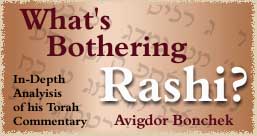

Back to this week's parsha | Previous Issues
Parashas Naso
Last week we asked (Parashas Bamidbar) what Rashi meant to tell us by his brief enigmatic comment to Numbers 1:17 on the words "And Moses and Aaron took these men who were designated by name." Rashi says: "These men": These twelve princes who were designated here by name. Our answer is: The previous time, before this verse, where the Torah refers to the princes of the tribes is in Exodus 35:27 There it says that the princes brought the stones for the ephod and the choshen mishpat. In them were inscribed the names of the twelve tribes.
We gave a hint to look at Rashi's comment on Exodus 28:10. There Rashi tells us who the twelve tribes were who were inscribed in the stones in the High Priest's ephod. He names them. Did you notice a difference between those twelve tribes and the twelve tribes listed here? This I believe is the point of Rashi enigmatic comment. Now to this week's sedra:
Parashas NasoNumbers 5:6,7 Speak to the Children of Israel: when a man or a woman shall do any of these sins against man to act deceitfully against Hashem and that person incurred guilt (Hebrew: "v'ashmah"). Then they shall confess their sin which they have done and he shall restore that wherein he is guilty together with the principal thereof, and add to it its fifth and give it to whom he is guilty (Hebrew: "l'asher asham lo"). RASHI on the Torah's words : "To whom he is guilty": RASHI: to whom he owes the money." Questioning Rashi
What would you ask here?
A Question: What has Rashi told us? Isn't he telling us exactly what the Torah verse says?
Back to this week's parsha | Previous Issues
|